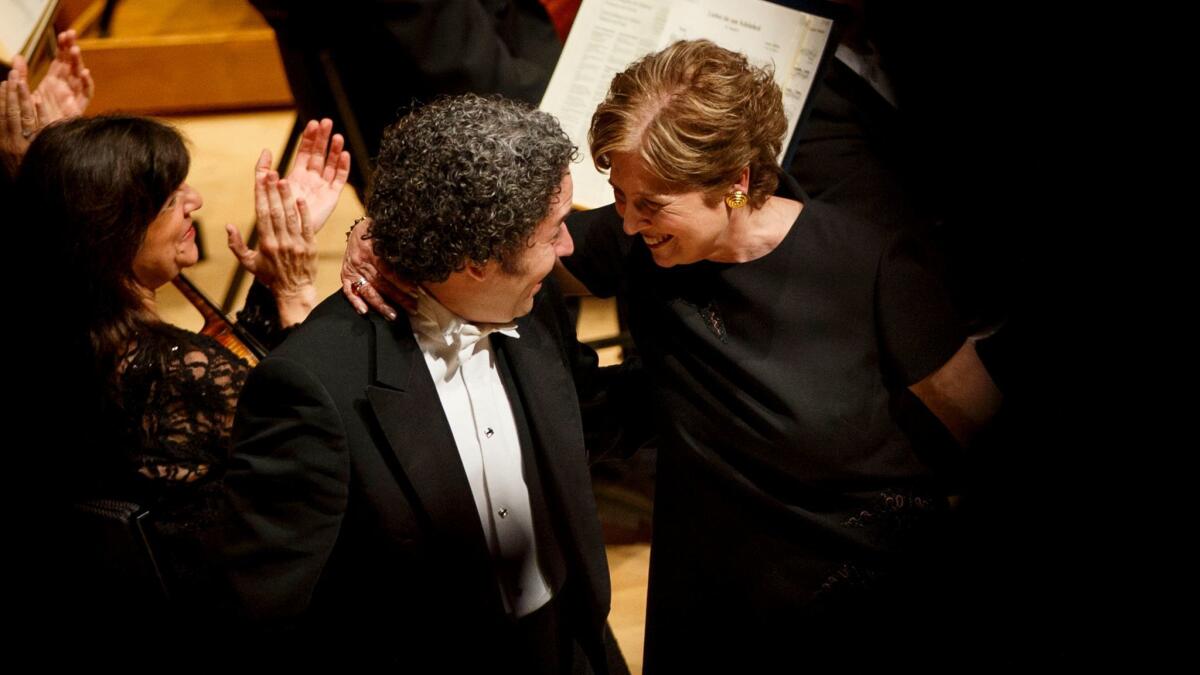Critic’s Notebook: Dudamel and the L.A. Phil bid a heartfelt farewell to Deborah Borda

- Share via
Gustavo Dudamel didn’t dedicate his silken performance of Schubert’s elegant Fifth Symphony on Thursday night to Deborah Borda. But the touchingly tender slow movement spoke for itself.
After opening his program with the symphony, having reached the two-thirds point in his current Schubert symphony cycle, Dudamel returned to the Walt Disney Concert Hall stage with a microphone in hand, accompanied by Borda, his departing Los Angeles Philharmonic boss, and by the orchestra’s board chairman, Jay Rasulo.
“It has been an amazing journey,” Dudamel said in his farewell speech to Borda, who leaves her post as president and chief executive here to head (and, the orchestra world hopes, save) the troubled New York Philharmonic after her historic 17-year tenure with the L.A. Phil. In explaining that journey “from being my stalker to becoming my lover,” Dudamel said: “Even if I have been hard sometimes, I love you.”
It was the orchestra’s brief, formal tribute to Borda, who oversaw the completion of Disney Hall and its celebrated opening, who empowered then-Music Director Esa-Pekka Salonen to realize such grand visions for the hall as the Peter Sellars and Bill Viola multimedia “Tristan Project,” who followed Dudamel around the world in her effort to hire him to succeed Salonen, who created Youth Orchestra L.A. (YOLA) and who turned a financially struggling orchestra into a the most prosperous and adventurous major ensemble in the world. “I hope no one is recording this,” Dudamel said (fat chance), but thanks to Borda, “we have become the envy of the world.”
For her part, Borda, a former orchestra musician herself, gave all the credit to the players, a supportive board, a uniquely warm and adventurous audience and, especially, to Dudamel. WIth her arms around “the man I stalked around Europe,” she told Dudamel, “I’ve learned so much from you. You changed my life in two ways when you said, ‘Music is a fundamental human right’ and ‘Our tradition is the future.’ ”
Orchestras are constitutionally unfit in a hundred ways to be one big, happy family. But in the rare orchestra that has had warm relationships with management for decades, the players gave Borda a tusch, the brief flourish meant only for the most special of occasions and almost always meant for another musician. Here it seemed in recognition of what may be the least appreciated secret by the outside world of Borda’s management style, however demanding, and how she developed lasting relations with artists, creating what she called an L.A. Phil family.
Dudamel never refers to the L.A. Phil as his orchestra but his family. And even Rasulo, whose life Borda has just made infinitely harder by creating the need for a replacement, said to her on stage Thursday what I doubt any other board chair has ever said to a departing orchestra director: “Remember you always have a loving family here.”
Dudamel then conducted the orchestra and mezzo-soprano Sasha Cooke in Mahler’s “Rückert-Lieder.” The last of the five songs is possibly the saddest and most beautiful song ever written: “I Am Lost to the World.”
My reflection on the surprising relevance of Dudamel’s Schubert cycle, which concludes over the weekend, will publish on Monday.
ALSO:
In a startling coup, New York lures L.A. Phil chief Deborah Borda
Reaction: Borda’s departure sends arts world spinning
The profile: The woman behind the L.A. Phil
More to Read
The biggest entertainment stories
Get our big stories about Hollywood, film, television, music, arts, culture and more right in your inbox as soon as they publish.
You may occasionally receive promotional content from the Los Angeles Times.











